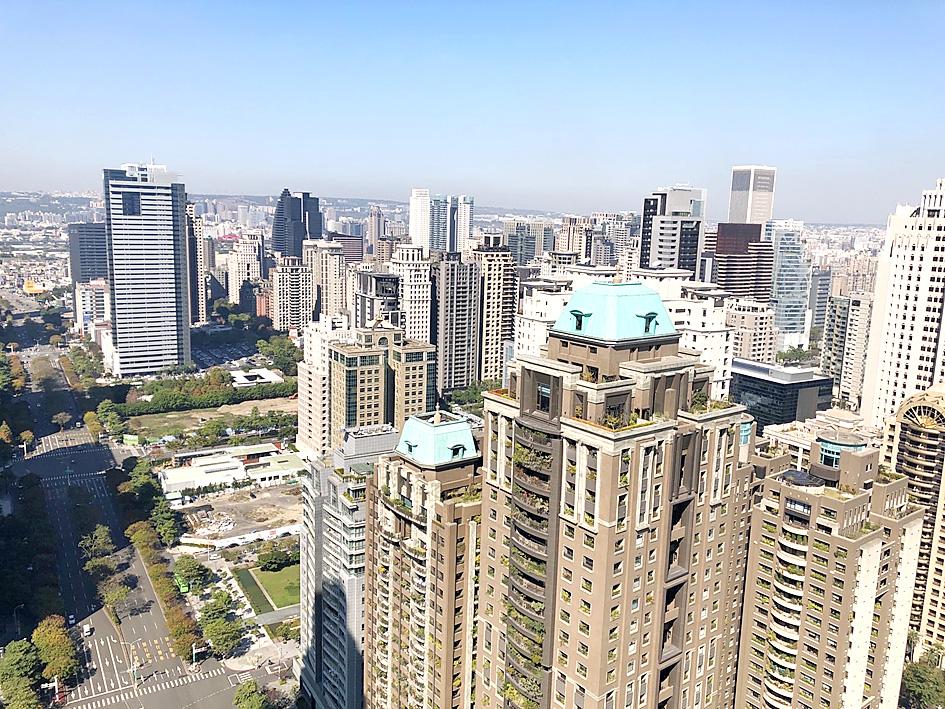Presale and new housing projects available for sale last quarter expanded 11.7 percent nationwide from three months earlier to NT$378.7 billion (US$13.65 billion) amid price hikes aided by a healthy economy and low interest rates, a survey by Cathay Real Estate Development Co (國泰建設) showed on Tuesday.
Asking prices picked up 9.11 percent on average across Taiwan, with the pace of growth exceeding 10 percent in New Taipei City, Tainan, Hsinchu City and Hsinchu County, it found, reflecting solid demand and rosy sentiment on the part of developers and builders.
The volume represented a 16.6 percent increase compared with a year earlier.

Photo: Hsu Yi-ping, Taipei Times
Heightening inflation expectations also led companies to raise selling prices for commodities, including building and decoration materials, and supported price hikes, despite waves of credit controls to cool the property market.
“Property transactions gained heat last quarter on the back of strong economic showings, excessive liquidity, low interest rates and worry over inflation,” the quarterly survey said.
However, concerns over fresh tightening measures and expectations of interest rate hikes later this year would help tame the market, it added.
Potential transaction prices averaged NT$345,800 per ping (3.3m2) during the October-to-December period, while concession rates shrank by 2.56 percentage points to 7.62 percent, it said, adding that the 30-day sales rates gained 0.56 percentage points to 17.07 percent.
By geographic breakdown, housing prices in Taipei grew 9.06 percent to NT$968,200 per ping and rose 11.2 percent in New Taipei City to NT$45,500 per ping, it said.
Tainan reported the biggest advance of 11.21 percent in new housing prices to NT$267,100 per ping, trailed by a 11.02 percent rise in Hsinchu City and Hsinchu County to NT$309,100 per ping, the survey said.
Retired land economics professor Chang Chin-oh (張金鶚), who helped conduct the survey, said housing prices rose to record highs nationwide, confirming property fever.
While housing prices might not see a correction in the near term, the uptrend would not last long, as global central banks are to reverse loose monetary policies and Taiwan’s government would take further measures to induce a soft landing, Chang said.
H&B Realty Co (住商不動產) said the latest price hikes have the backing of economic fundamentals and real demand.
Taiwan Semiconductor Manufacturing Co’s (台積電) announcement to build new plants in Tainan, Kaohsiung and Taichung would create well-paid jobs in those areas, causing housing prices there to surge by double-digit percentage points, H&B head researcher Jessica Hsu (徐佳馨) said.

Stephen Garrett, a 27-year-old graduate student, always thought he would study in China, but first the country’s restrictive COVID-19 policies made it nearly impossible and now he has other concerns. The cost is one deterrent, but Garrett is more worried about restrictions on academic freedom and the personal risk of being stranded in China. He is not alone. Only about 700 American students are studying at Chinese universities, down from a peak of nearly 25,000 a decade ago, while there are nearly 300,000 Chinese students at US schools. Some young Americans are discouraged from investing their time in China by what they see

MAJOR DROP: CEO Tim Cook, who is visiting Hanoi, pledged the firm was committed to Vietnam after its smartphone shipments declined 9.6% annually in the first quarter Apple Inc yesterday said it would increase spending on suppliers in Vietnam, a key production hub, as CEO Tim Cook arrived in the country for a two-day visit. The iPhone maker announced the news in a statement on its Web site, but gave no details of how much it would spend or where the money would go. Cook is expected to meet programmers, content creators and students during his visit, online newspaper VnExpress reported. The visit comes as US President Joe Biden’s administration seeks to ramp up Vietnam’s role in the global tech supply chain to reduce the US’ dependence on China. Images on

New apartments in Taiwan’s major cities are getting smaller, while old apartments are increasingly occupied by older people, many of whom live alone, government data showed. The phenomenon has to do with sharpening unaffordable property prices and an aging population, property brokers said. Apartments with one bedroom that are two years old or older have gained a noticeable presence in the nation’s six special municipalities as well as Hsinchu county and city in the past five years, Evertrust Rehouse Co (永慶房產集團) found, citing data from the government’s real-price transaction platform. In Taipei, apartments with one bedroom accounted for 19 percent of deals last

US CONSCULTANT: The US Department of Commerce’s Ursula Burns is a rarely seen US government consultant to be put forward to sit on the board, nominated as an independent director Taiwan Semiconductor Manufacturing Co (TSMC, 台積電), the world’s largest contract chipmaker, yesterday nominated 10 candidates for its new board of directors, including Ursula Burns from the US Department of Commerce. It is rare that TSMC has nominated a US government consultant to sit on its board. Burns was nominated as one of seven independent directors. She is vice chair of the department’s Advisory Council on Supply Chain Competitiveness. Burns is to stand for election at TSMC’s annual shareholders’ meeting on June 4 along with the rest of the candidates. TSMC chairman Mark Liu (劉德音) was not on the list after in December last